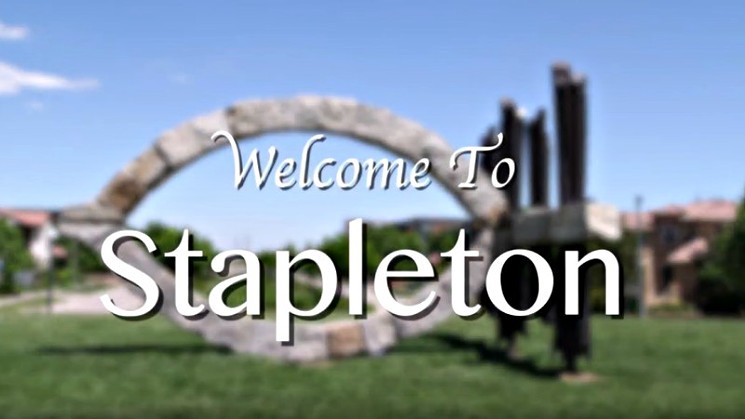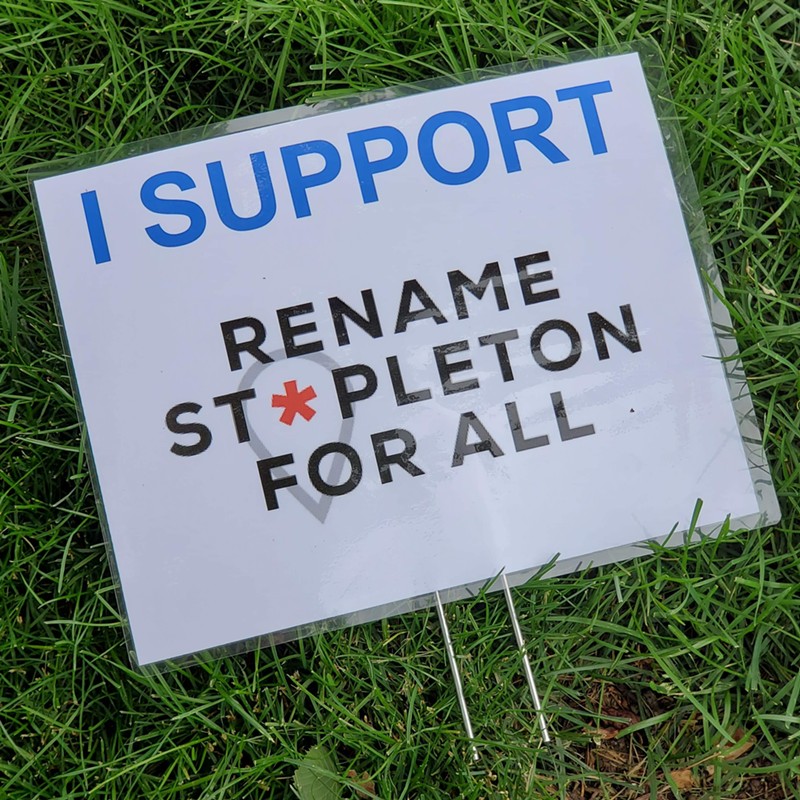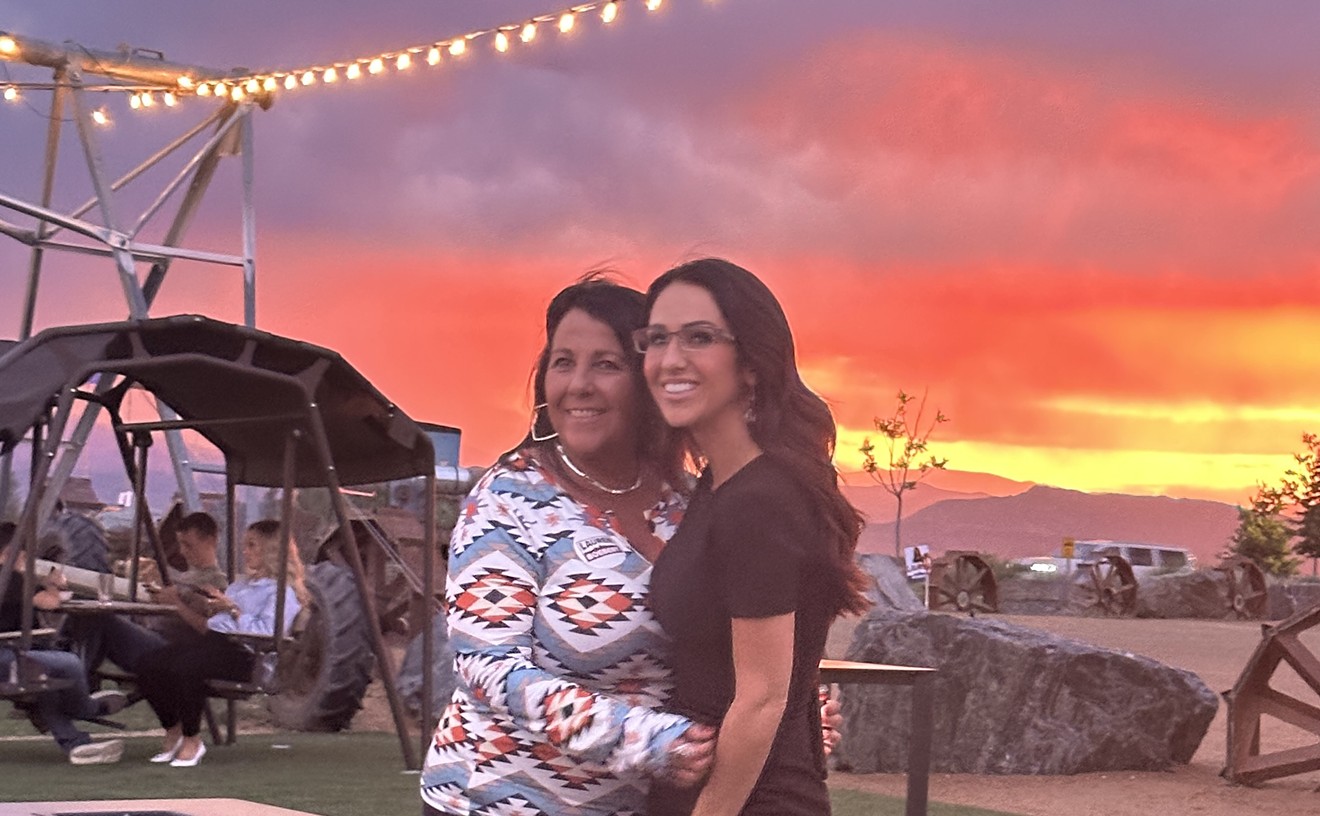"Why does Denver still honor a former KKK leader with a neighborhood?" asked Anderson, the 21-year-old graduate of Manual High School. "I am calling on city officials to publicly denounce the name “Stapleton” and urge their neighborhood association to change the name!"
Just eight minutes later, Anderson followed up with this tweet: "The neighbors of Stapleton have ONE WEEK to change their name ... if they do NOT we will march through their neighborhood to show them #BlackLivesMatter."
The next day, the Master Community Association of Stapleton announced on Facebook that its delegates would be voting on a neighborhood name change in the coming days.
"It is our hope that by changing the name of the community, we will send a strong message that we are an inclusive neighborhood that does not support racism, hatred or bigotry. Rather, we are a thriving community that values diversity, inclusion, equity and respect, and we encourage others in our community to join us as we stand up against systemic racism," the MCA wrote.
And just like that, momentum from the George Floyd protests had pushed to the forefront an issue that some activists have been working on for decades. Now change seems imminent, and even members of the Stapleon family support a name change for the neighborhood named after an airport named after a mayor who'd been a leading member of the Ku Klux Klan.
In 1944, two decades after he was first elected mayor of Denver, Benjamin Stapleton received a great honor: The Denver Municipal Airport was renamed Stapleton Airfield.
Building the airport had been one of Stapleton's major achievements during his first round as Denver mayor, which began in 1923. Before then, and into his first few years in office, Stapleton was a card-carrying member of the most infamous American hate organization.
"Unfortunately, it reflected a strong sentiment in the state, which is one of the reasons why so many members of the KKK ended up attaining office," says William Wei, the Colorado state historian.

Ben Stapleton was elected mayor of Denver in 1923, when he was a leading member of the KKK.
Denver Public Library
Viewing Klan support as a key to surviving the recall election, Stapleton addressed a July 24 Klan rally: "I have little to say, except that I will work with the Klan and for the Klan in the coming election, heart and soul. And if I am re-elected, I shall give the Klan the kind of administration it wants."
Stapleton easily won the recall election. When they heard the results, Klansmen who had gathered on South Table Mountain celebrated by burning crosses that were visible in Denver, according to Goldberg's book, Hooded Empire: the Ku Klux Klan in Colorado.
By the time the Klan's power peaked in Colorado a year later, "it had infiltrated all levels of the state government. The Klan controlled many members of the legislature, held the State Supreme Court judgeship and seven benches on the Denver District Courts, and had controlling majorities in some town councils. Some of the most notable Klansmen at the time" included Mayor Stapleton, Denver Police Chief William Candlish and Governor Clarence Morley, according to the Colorado Encyclopedia.
But in April 1925, Stapleton turned on the Klan, launching a series of "vice raids" that resulted in the suspensions of high-ranking police officers, all Klansmen, on corruption charges. Ties between Stapleton and the Klan continued to fray until 1927, when he won re-election without the Klan's endorsement. Aside from a break of four years, between 1931 and 1935, Stapleton served as mayor until 1947, when he lost to Quigg Newton, a Yale-educated lawyer.
Stapleton died in 1950. Fourteen years later, Denver doubled down on the Stapleton name, transforming Stapleton Airfield into Stapleton International Airport. "I suspect that it was, in part, a reaction to the civil-rights movement that was occurring at that time, during the mid-1960s," Wei says. "They came up with this way of honoring him and were implicitly opposing the efforts of civil rights."
But soon opposition to the airport's name began to materialize, according to the group Rename St*pleton for All.
"There was a group of black men and women who advocated for renaming of the airport itself while it was still the airport," says Liz Stalnaker, board chair of Rename St*pleton for All.
In 1995, the City of Denver finally opened the long-awaited Denver International Airport, far to the northeast of the city. That left a big area empty much closer to the center of the growing city.

For decades, activists have been trying to get rid of former mayor Ben Stapleton's name on this neighborhood.
Wellington Webb, Denver's mayor at the time and the city's first black mayor, says that transitioning the name of the airport to the name of the neighborhood was "the road of least resistance, the road that made sense, historically, at the time."
He recalls "no conversation" about whether the Stapleton name was appropriate. "It never came up," says Webb, who's supported a name change in recent years.
But some activists already wanted the Stapleton moniker dumped. The continued use of "the name is like having a KKK flag waved in our faces," JuJu Nkrumah told the Park Hill News in September 2001.
In 2003, the Master Community Association created a mechanism to allow for a potential name change for the Stapleton neighborhood. In 2004, the first residents of the area moved in.
Ten years passed before community advocates again started lobbying for a name change for the neighborhood, now home to over 20,000 residents.
In 2015, Black Lives Matter 5280 members flew a banner that read #ChangeTheNameStapleton from the East 29th Avenue Town Center sign in Stapleton. They also distributed fliers pushing for a change around the neighborhood.
But the real push didn't begin until August 2017, after the Unite the Right rally in Charlottesville, Virginia. "The violence and white supremacists marching in Charlottesville galvanized and renewed the energy in our community," says Stalnaker, who has lived in Stapleton since 2015.
After the rally, the Stapleton United Neighbors organization issued a letter "condemning white supremacy and racist monuments," she recalls, adding that in a prime example of cognitive dissonance, "it was sent out on letterhead that bore the name Stapleton."
Advocates for the name change then formed Rename St*pleton for All. But the movement still didn't really take off. Chris Herndon, the city councilman whose district includes Stapleton, said he didn't think a new name was necessary.
"This was the airport. And that's who it was named after," Herndon told 9News in August 2017. "Look what this has become. It's a great history lesson. It's a great lesson for our children to know what we did before, but look what we have become now."
Still, in the months that followed, organizations began to drop their association with the name Stapleton, and it also disappeared from some signage. In August 2019, the Master Community Association held a neighborhood-wide referendum of property owners in Stapleton. In a turnout of approximately 33 percent, 65 percent of those who voted wanted to keep the Stapleton name.
"We are disappointed and saddened by these results, but we are not especially surprised. The Master Community Association (MCA) initiated and administered this referendum; Rename St*pleton for All did not," that organization pointed out. "In fact, we had asked the MCA to delay sending ballots because we believed that more conversations to promote understanding and community outreach on the issue should have occurred for all residents — renters and owners alike — before members or delegates were asked to vote."
Less than a year later, the protests over George Floyd's death at the hands of Minneapolis police have led to significant changes in Colorado, with a police-reform bill approved by the legislature, local agencies changing their use-of-force policies, and DPS cutting off the DPD.
According to Stalnaker, some delegates on the Master Community Association had already been pushing privately for a name change. And then Tay Anderson tweeted. "I am really happy to see Tay use his platform to lift up this issue in the public consciousness," she says.
"I think it’s appropriate," Mayor Michael Hancock says. "It’s the appropriate thing to do. It has been the appropriate thing for quite some time....There’s a place for all of us to seek history. There’s a place for us to see history. It’s not when you’re driving in communities. Give them the choice to go into libraries and museums and learn about history."
Herndon has come around to support the name-change efforts.
"I think we can all agree now that, as a neighborhood, as a city, as a society, we’re in a place that we’ve never been before in my lifetime. We’re having some candid, real, raw conversations about systemic racism and white supremacy," Herndon says, adding that he looks forward to supporting the community as it chooses a "more inclusive name for the neighborhood."
Even members of the Stapleton family think it's time for a change. As mayor, Ben Stapleton did some good things, says Jenna Stapleton, who's married to Walker Stapleton, his great-grandson. But the KKK connection is undeniable. "So we have to not honor his legacy at all at this point," she says. "There can't be a nuanced or gray situation."
A a meeting of delegates to the Master Community Association of Stapleton on Wednesday, June 17, delegates voted to get rid of the Stapleton name, removing it from all "branding, marketing and community outreach materials, including signage" and also removing any references to Stapleton as the community name in governing documents. They also voted to support Stapleton United Neighbors in its efforts to identify a new community name as soon as possible, while still allowing for community engagement.
Former mayor Webb would like to see the neighborhood renamed Landri, in honor of Landri Taylor, a well-known Denver public servant who passed away in February. Taylor, who served on the Denver Public School Board, was CEO of the Stapleton Foundation for Sustainable Urban Communities in late 2017, when that organization decided to drop Stapleton from its name.
Stalnaker says that there's some support for naming the neighborhood Westbrook, in honor of Joseph H.P. Westbrook, a medical doctor and light-skinned black man who infiltrated the KKK at its height in Colorado.
Others want to call the neighborhood Justina to pay homage to Justina Ford, the first female African-American doctor in Denver.
"Changing the name is a way of empowering those who oppose what Stapleton stood for and what the KKK stood for," says Wei. "I think that’s a very positive thing."
Update: This story was updated at 1:45 p.m. on June 17 to reflect the outcome of the name-change vote.












